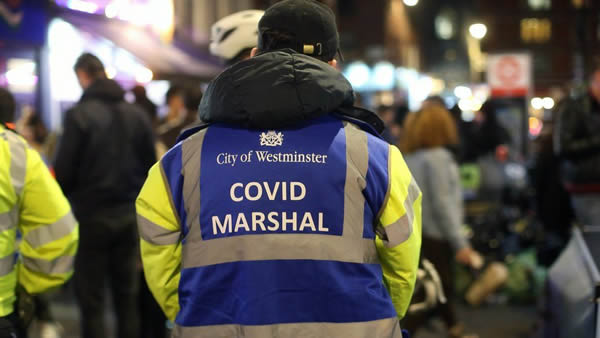
A third case of the Omicron coronavirus variant has been detected in the UK, the Health Security Agency has said.
It said the case involves a person who visited the Westminster area of London but who is no longer in the UK.
The individual is linked to travel in southern Africa, where Omicron was first identified.
Meanwhile, year 7 pupils in schools in England are being told they will have to wear face masks in communal areas in response to the new variant.
Early evidence suggests the new variant – first reported to the World Health Organization from South Africa on Wednesday – has a higher re-infection risk.
The first UK cases were confirmed on Saturday in Brentwood, Essex and Nottingham. Officials said the cases were linked and connected to travel in southern Africa and contact tracing is taking place.
Essex County Council is now asking people who were at a church and a KFC outlet in the town to get a PCR test.
The appeal is for members of the congregation who were at Trinity Church in the Pilgrims Hatch area on 21 November – and staff, customers and delivery workers who were at KFC in Brentwood High Street on 19 November between 13:00 and 17:00.
Testing is being carried out at locations that the individual in the third confirmed case visited in London, the UK Health Security Agency (UKHSA) said.
The agency said it was “very likely” more cases would be found in the coming days.
Dr Jenny Harries, chief executive of the UKHSA, said: “Our advanced sequencing capabilities enable us to find variants and take rapid action to limit onward spread.
“We are continuing our efforts to understand the effect of this variant on transmissibility, severe disease, mortality, antibody response and vaccine efficacy.
“It’s critical that anyone with Covid-19 symptoms isolates and gets a PCR test immediately. Vaccination is critical to help us bolster our defences against this new variant.”
Prof Neil Ferguson – a key government adviser on the pandemic – said “it’s likely we’ll detect quite a lot more cases in the coming days” because the UK is among the countries to see the largest number of flights from South Africa, where the variant is circulating.
The variant has now also been detected in a number of other countries, including Belgium, Denmark, Germany, Italy, the Netherlands, Australia, Hong Kong and Israel.
The government has also announced that face masks will be compulsory in shops and on public transport in England, and UK arrivals are expected to have to take PCR tests from Tuesday.
Health Secretary Sajid Javid said the government had acted “swiftly” and “in a proportionate way”.
One change has already been implemented. Ten countries in southern Africa are now on the UK’s travel red list.
That was applied from 04:00 GMT on Sunday, meaning that until further notice, any British or Irish residents arriving in the UK after recently visiting any of those countries will have to quarantine in an approved hotel for 10 days.
Residents from the countries themselves will not be allowed into the UK until the red list status changes.
But the government has stopped short of issuing advice to work from home or requiring vaccine passports in England, which are part of its Plan B for winter – a contingency plan if intervention on Covid is needed to protect the NHS.
Prime Minister Boris Johnson called the new measures temporary and precautionary – and said they would be reviewed in three weeks, just before most schools break up for the Christmas holidays.
Labour has called for full implementation of Plan B and for improved sick pay to encourage self-isolation.
Under the rules:
- Everyone entering the UK (other than those coming from the Common Travel Area that covers the Channel Islands and Ireland) will have to take a PCR test by the end of the second day after their arrival and self-isolate until they receive a negative result
- All contacts of suspected Omicron cases must self-isolate, regardless of whether or not they are fully vaccinated
- Face coverings will be made compulsory in shops and on public transport – but pubs and restaurants are exempt
- The health secretary has asked advisers to consider rapidly extending boosters, including reducing the gap between the second dose of the vaccine and the booster
In Scotland, Wales and Northern Ireland, face coverings are already mandatory on public transport and many indoor areas.
Asked about Scotland’s approach to the new variant, First Minister Nicola Sturgeon said “we may need to go further in restricting travel in the days to come”, adding: “We need to be open-minded to doing anything to keep the population safe.”
Meanwhile, adults aged 18 and over “will have an offer of a booster earlier than we had previously envisaged”, the deputy chairman of the Joint Committee on Vaccines and Immunisation told BBC Radio 4’s Broadcasting House.
Professor Anthony Harnden said: “There is a very good, strong argument for raising the antibody level in the whole of the community. So accelerating the booster programme both by extending the age range and by reducing the interval between the second dose and the booster dose, would be a sensible strategy.”
The average number of daily confirmed Covid cases in the UK began rising again in early November. A further 37,681 confirmed cases were announced on Sunday.
Source: BBC























